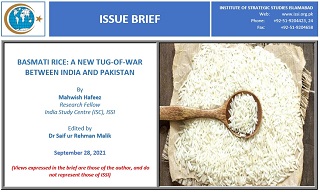India’s application for an exclusive trademark for the grant of sole ownership of the basmati rice title in the European Union is an intellectual assault on Pakistan’s rights and commercial interests.
In July 2018,[1] without informing Pakistan, India submitted an application for the protected geographical indication (PGI) status for basmati rice to the European Union’s Council on Quality Schemes for Agricultural Products and Foodstuffs. The geographical indication (GI) is meant to mark any product having “qualities, reputation or characteristics relating to its place of origin”[2]
It is worth mentioning here that both India and Pakistan are the sole exporters of Basmati rice. For years, the EU has been applying zero tariffs on rice that is authenticated by either Pakistan or India as genuine basmati. While arguing in favour of its application for GI to the EU, India maintained that Basmati is grown in the states of Punjab, Haryana, Delhi, Himachal Pradesh, Uttarakhand as well as in some areas of Indian occupied Kashmir. Further, in a bizarre remark, India’s Permanent Representative to UNESCO Mr. Vishal V Sharma argued that “it is a question of intangible cultural legacy of India. The creation of Pakistan was on the basis of rejection of the Indian identity, history and culture. Else, why partition? Hence, one is free to grow what one wants in Pakistan, but cannot use the trademark basmati.”[3]















